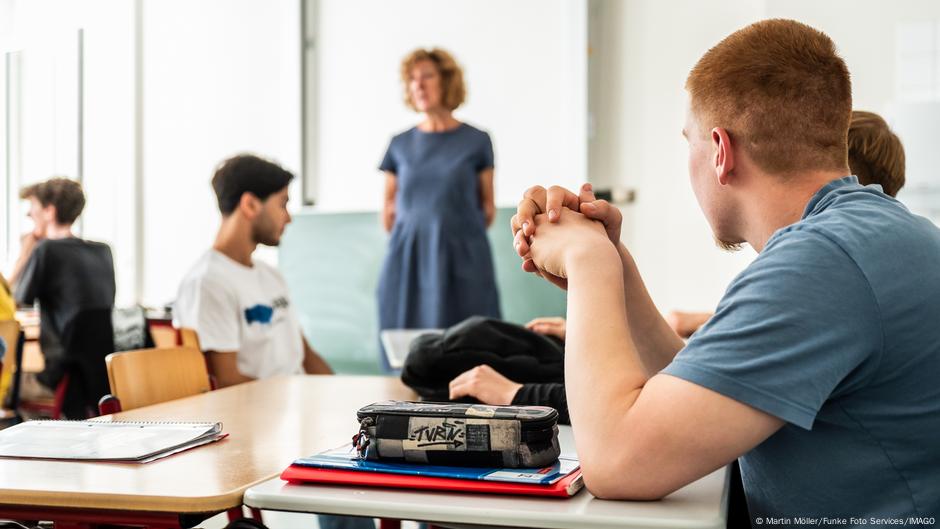Crises, disasters, wars: these topics have long been covered in German schools, at least at the abstract, academic level. But how prepared are students in practical terms for real-life crisis situations? Do they know what to do in an attack or emergency situation?
German Interior Minister Alexander Dobrindt of the conservative Christian Social Union (CSU) wants training for such scenarios in schools. This includes how to use a fire extinguisher, but also how to respond if a fellow student is injured and how to perform CPR.
“I suggest that, once every school year, an extended lesson be conducted with older students, covering different potential threat scenarios and how to prepare for them,” she said. Handelsblatt Newspaper. He said how to prepare for crises should be part of everyday school life.
The Interior Minister’s statements coincide with those of many observers, as well as Chancellor Friedrich Merz, who recently said, referring to the hybrid threat from Russia: “We are not at war, but no longer at peace either.”
Many experts consider it possible that Russia, under the leadership of Vladimir Putin, could attack NATO territory before the end of the decade. In a time of danger and war against Ukraine, Germany wants to prepare with both a stronger army and better civil defense.
Teachers in favor of new plan
The Interior Minister’s suggestion was well received by the influential German Teachers Association (DL), a major organization representing about 165,000 teachers in Germany. “To be honest, the war has long since reached the classrooms,” DL president Stephane Dull told DW. “Recently, Mr. Dobrindt has indicated that the topic of crisis and war is something that should be dealt with in schools because youth ultimately have the right to discuss openly and honestly the things that may affect them.”
Training for emergency situations can help. “You learn options for action and doing that builds capacity and capability. It develops resilience, because I’ve dealt with things that are not pleasant, but I can really cope with them,” Duell said.
During his school years, Quentin Gartner experienced no preparation for war or crisis. “The only thing I know of is the classic fire alarm,” the general secretary of the Federal School Students Council (BSK), which represents the interests of young people, told DW.
“It makes sense for us to prepare for disaster scenarios,” he said, adding that people “feel safer if you’re prepared for an emergency and know what’s going to happen.” Gartner said practicing for wars and disasters would also help foster “resilient societies” – and this would be especially important in times of war. Just like “staying calm and reducing stress in a crisis situation.”
The youth representative emphasized one thing: “School social workers and school psychologists should be involved in these lessons.” Not all students are mentally prepared to be able to deal with these scenarios.
Mixed reaction among politicians
Dobrindt’s suggestion received a mixed reaction among opposition parties. “This is clearly intended to instill fear,” Nicole Goehlke, parliamentary leader of the Socialist Left party, told news agency AFP. “I find this bullying, especially with children and young people, unacceptable,” he criticized.
There was also criticism from the far-right Alternative for Germany party (AfD). Gottfried Curio, the AfD’s internal policy spokesman, said the interior minister was “trying to make the idea of any contact taken for granted, even inevitable.”
However, the idea was supported by the Green Party. Co-leader Felix Banaszak said in an interview with private broadcaster RTL: “No, it’s not fear-mongering.” However, he does not agree that one extended lesson per year is enough to adequately prepare students.
The federal government of Germany can only make recommendations for what is taught in schools. Only the individual education ministries in each state have the authority to decide on the curriculum.
The German government wants to massively increase spending on civil and disaster protection. Its “civil protection accord” is budgeted for about €10 billion ($11.6 billion) through 2029, including modernizing shelters, warning systems, backup water supplies and providing emergency vehicles.
Dobrindt has also urged the population to stock up on supplies. “It can’t do any harm. You don’t need to prepare to understand that a few days’ supplies, a flashlight, batteries or a wind-up radio are reasonable precautions. Anyone who has these is not nervous, but prepared,” Dobrindt explained. Handelsblatt,
Japan or Poland as model?
Preparing for a crisis has long been an important part of the education system in Japan. The country is affected by many natural disasters like earthquakes and storms. Regular military threats by North Korean dictator Kim Jong-un also cause uncertainty in the region. That’s why lessons on how to prepare for a disaster begin in kindergarten, and emergency drills are routine in primary and secondary schools.
Poland, which borders Ukraine, takes a similar approach. Many Poles feel the threat from Russia more deeply, and there is also mandatory weapons and security training for 14- to 15-year-olds in schools. Live ammunition is not used, but students are taught to assemble, load, and unload the firearm. Shooting is practiced using a laser or a blank.
“I think it’s a good idea. Life is scary these days, so you have to be prepared for anything,” Marta Stolińska of the Nicolaus Copernicus Primary School in Skarszewy, near Gdańsk, told DW in December 2024. For Alan Jaron, the training is simply “fun”, and “it feels really good to hold a gun in your hands and shoot.” Parents and teachers support weapons training.
This approach is viewed with great suspicion in Germany, where there is a more pacifist culture. “German school campus barracks are not parade grounds,” Stefan Düll of the teachers union told DW. “It is not the students’ job to learn how to fire, but the army’s job,” he said. Youth advocate Quentin Gartner considers the Polish approach absolutely unacceptable: “Shooting lessons are certainly not part of good disaster preparedness.”
This article was originally written in German.






Leave a Reply